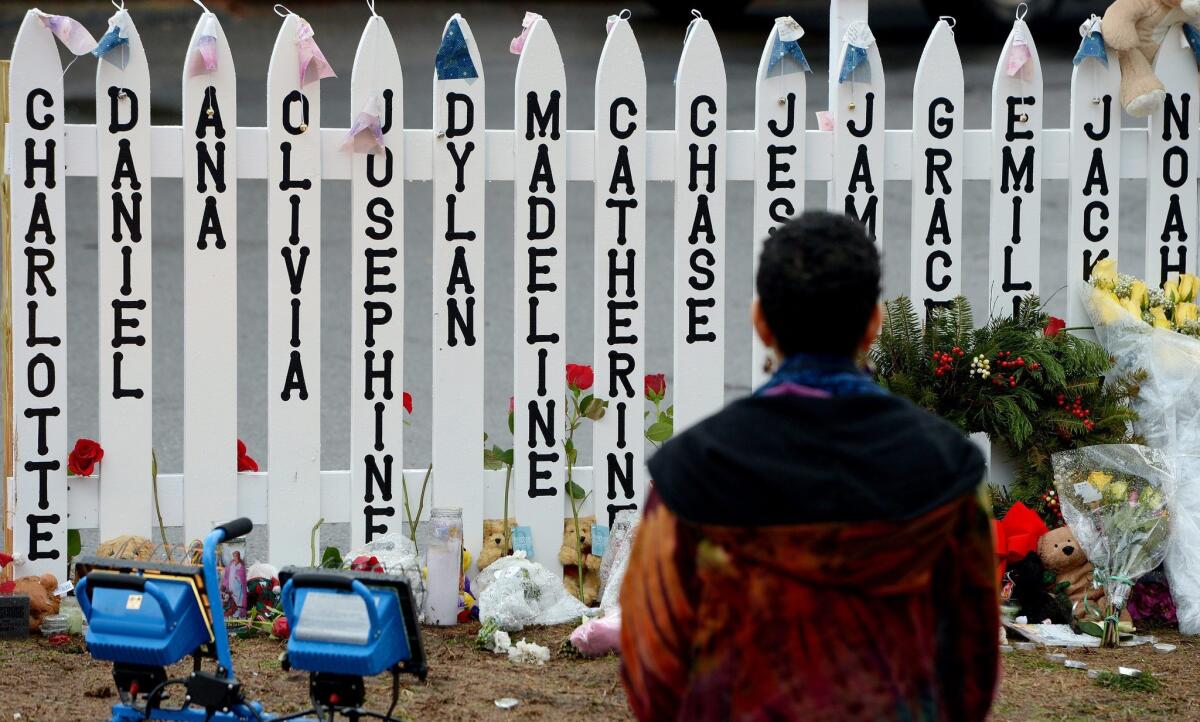Sandy Hook’s victims: Did we let them down?

- Share via
The killing last December of 20 children and six adults at Sandy Hook Elementary School in Newtown, Conn., was expected to finally change this country’s apathy toward gun control. It seemed impossible, after so many 6- and 7-year-olds cowering in their classrooms were methodically shot and killed by a young man armed with a military-style semiautomatic weapon, that the nation’s leaders would not begin to limit access to tools of mass murder.
But it didn’t happen. A year later, on the first anniversary of the Newtown massacre, reasonable gun control legislation has been blocked in Congress and it’s still far too easy to acquire a weapon that can kill a dozen people in seconds.
What happened to the urgency? The obligation to prevent another atrocity? Apparently, the moral imperative is fleeting, while subservience to the National Rifle Assn. endures.
In the weeks after Newtown, President Obama proposed a series of changes to reduce gun violence, including banning assault weapons and high-capacity magazines, stricter gun trafficking laws and improving mental health services. But even though a majority of Americans said they backed a harder line on gun control, the president and Sandy Hook parents-turned-activists were stymied in Congress.
First to go were important but more controversial bills like California Sen. Dianne Feinstein’s improved version of her earlier assault weapon ban, which had expired in 2004. Democratic leaders gave up the fight for the new ban to focus on measures with more bipartisan support, such as expanding the criminal background check system and cracking down on straw purchasers who buy guns on behalf of criminals. But even those proposals were rejected under powerful pressure from the NRA.
While Congress failed to act, several states did pass meaningful gun control legislation, including New York, Connecticut and Colorado. There’s been pushback, including the recall of two Colorado state legislators who helped pass universal background checks on gun purchases and new limits on ammunition magazines. And the broader trend at the state level is to loosen gun laws, not tighten them. A recent New York Times analysis found that state legislatures passed 109 laws on guns after the Newtown massacre. Two-thirds of them eased gun restrictions.
And what became of Obama’s call to make access to mental health care “as easy as access to a gun”? Again, Congress punted. Some 36 states increased funding for mental health services and a dozen states passed laws enabling more people to receive court-ordered treatment for severe mental illness.
There may still be hope. Newtown gave rise to a new political consciousness among parents, moderate voters and Americans who didn’t previously feel passionate about the issue of gun control. While the sense of urgency that followed the massacre may be receding, the fight for rational gun laws must go on. The safety of children must prevail over the power of the gun lobby.
More to Read
A cure for the common opinion
Get thought-provoking perspectives with our weekly newsletter.
You may occasionally receive promotional content from the Los Angeles Times.









